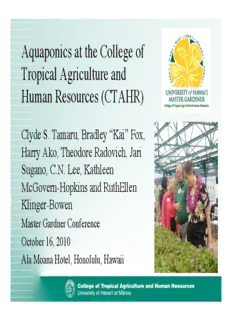
Aquaponics in CTAHR - University of Hawaii PDF
Preview Aquaponics in CTAHR - University of Hawaii
Aquaponics at the College of Tropical Agriculture and Human Resources (CTAHR) Clyde S. Tamaru, Bradley “Kai” Fox, Harry Ako, Theodore Radovich, Jari Sugano, C.N. Lee, Kathleen McGovern-Hopkins and RuthEllen Klinger-Bowen Master Gardner Conference October 16, 2010 Ala Moana Hotel, Honolulu, Hawaii Who is Clyde Tamaru and Why is He Here? • Royal Elementary • Central Intermediate • McKinley High School • B.S. Biology, @ UH Mānoa • M.S. Zoology, @ UH Mānoa • Ph.D. Faculty of Agriculture, Dept. of University of Tokyo 東京大学 Fisheries, University of 1877 Tokyo Who is Clyde Tamaru and Why is He Here? Provide technical assistance to aquaculture stakeholders and now includes Aquaponic stakeholders. Who is Clyde Tamaru and Why is He Here? Maintains a research and extension portfolio involving three institutions. For over a thousand years ancient Hawaiians were completed isolated from the rest of the world. Hawaii Currently, over 80% of our food and 90% of our energy is imported LIFE IN THE AHUPUA‘A Food Was Gathered LIFE IN THE AHUPUA‘A Food Was Grown • “Some large ponds which appeared to be full of fish. He [the king] mentioned he had some others with a great quantity of turtle” - J. Meares – 1789 • “for industry of cultivation and agricultural improvements they could scarcely be exceeded in any country in the world” – Archibald Menzies - Menzies' Journal of Vancouver's Voyage, April to October, 1792 Vancouver Menzies Meares Who are We and Why are We Here? Vision: CTAHR will actively help Hawai‘i diversify its economy, ensure a sustainable environment, and strengthen its communities, and will be the premier resource for tropical agricultural systems and natural resource management in the Asia-Pacific region. “Producing more of Hawai’s food and fuel here in the islands is a vital step in creating a sustainable future”. http:// “Centennial” – white anthurium www.ctahr.hawaii.edu/downloads/ bred by UH scientists to celebrate 2010_POW.pdf 100th birthday Land Grant College System • Universities or colleges that receives the benefits of the Morill Acts of 1862 and 1890 (Education) • Hatch Act of 1887 allowed land Justin Morrill Abraham Lincoln grant colleges to create agricultural research stations to conduct practical research that would assist farmers (Research) • Smith-Lever Act of 1914 results in the cooperative extension services and a mechanism for technology transfer (Extension)
Description: